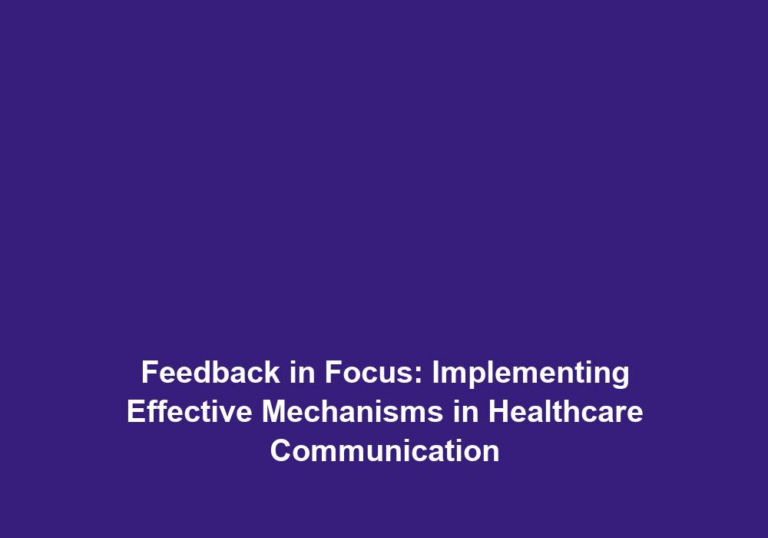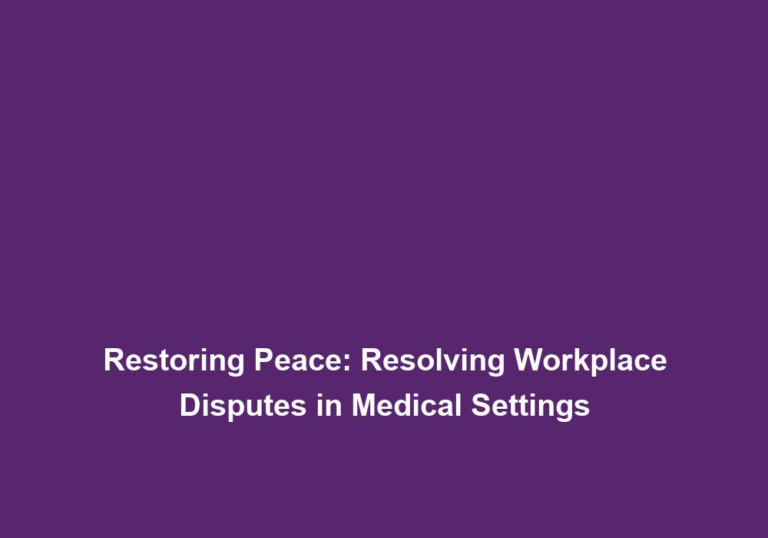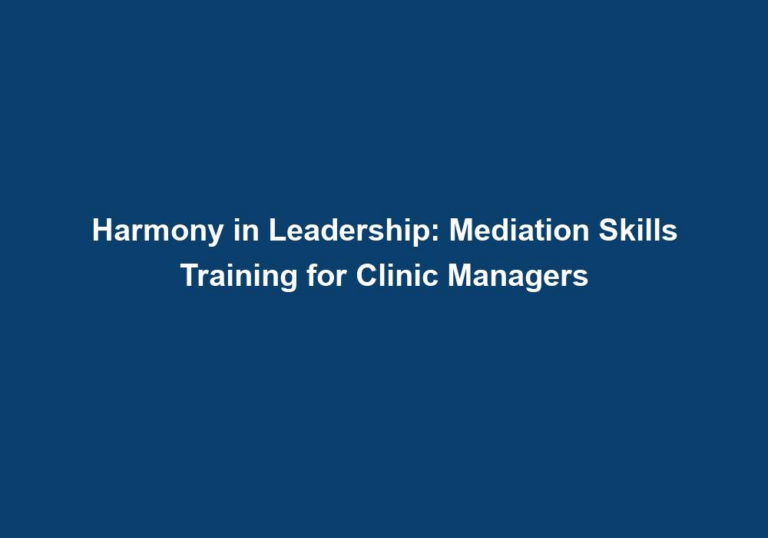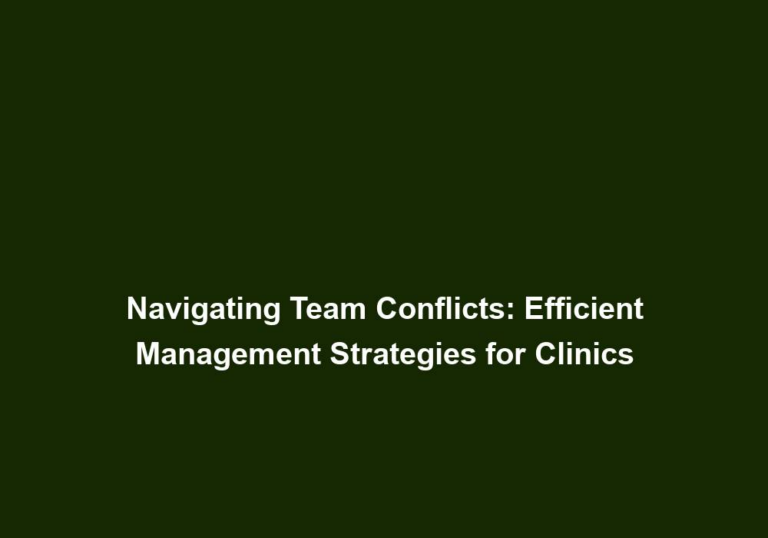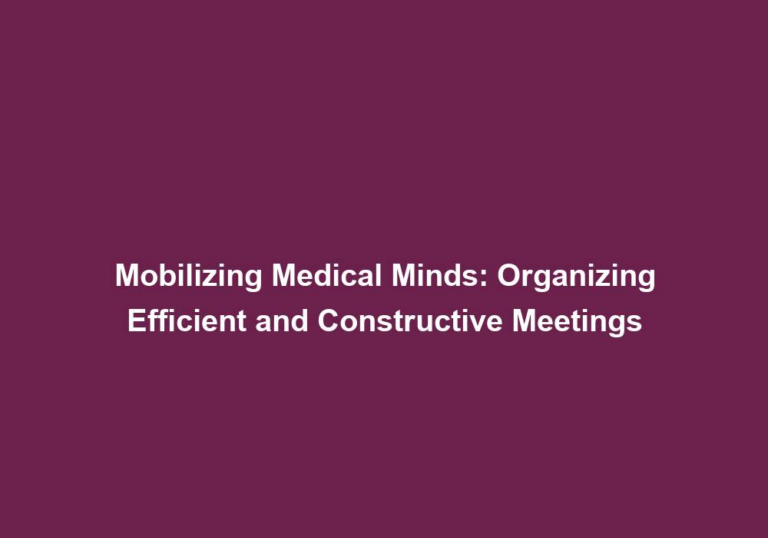Unity in Practice: Transformative Team Building Workshops for Healthcare Professionals
In the fast-paced and demanding world of healthcare, effective teamwork and collaboration are essential for providing high-quality patient care. Unity Practice is a transformative team building workshop specifically designed for healthcare professionals to enhance their ability to work together harmoniously and efficiently. By fostering a sense of unity and developing essential skills, this workshop aims to create a cohesive and collaborative healthcare team. In this article, we will delve into the key components and benefits of Unity Practice for healthcare professionals.
Why Team Building Matters in Healthcare
Healthcare professionals, including doctors, nurses, technicians, and administrators, often work in complex and high-stress environments. The success of any healthcare organization relies heavily on effective teamwork, communication, and collaboration among its members. Team building activities can significantly contribute to improving these essential skills within the healthcare team.
Some key reasons why team building matters in healthcare include:
- Enhanced Communication:
Effective communication is crucial for sharing information, clarifying doubts, and preventing misunderstandings among healthcare professionals. Team building workshops like Unity Practice can help improve communication skills, ensuring a smooth flow of information within the team.
- Improved communication leads to better patient outcomes, as healthcare professionals can exchange critical information and make informed decisions.
- Clear and concise communication reduces the risk of errors and misunderstandings, promoting patient safety.
- Active listening skills developed through team building activities enable healthcare professionals to understand patient needs and concerns effectively.
- Increased Collaboration:
In healthcare, collaboration is vital for coordinating patient care across different departments and disciplines. Team building activities promote an environment where healthcare professionals can work together, leveraging their individual strengths and expertise to achieve common goals.
- Collaboration improves efficiency and reduces duplication of efforts, leading to streamlined patient care processes.
- By sharing knowledge and expertise, healthcare professionals can provide comprehensive and holistic care to patients.
- Collaborative teamwork fosters innovation and creativity, allowing healthcare professionals to find novel solutions to complex challenges.
- Improved Morale and Job Satisfaction:
Team building workshops provide an opportunity for healthcare professionals to connect with their colleagues on a personal level, fostering a sense of camaraderie and mutual support. This, in turn, boosts morale and job satisfaction, leading to a more positive work environment.
- Building strong relationships and a supportive network among healthcare professionals creates a sense of belonging and improves overall job satisfaction.
- A positive work environment enhances employee engagement and motivation, resulting in higher productivity and performance.
- Increased job satisfaction reduces turnover rates, ensuring continuity of care and stability within healthcare organizations.
- Enhanced Problem-Solving Skills:
Healthcare professionals often encounter complex and challenging situations. Team building activities can help develop problem-solving skills by encouraging creative thinking, collaboration, and sharing of diverse perspectives.
- Problem-solving exercises during team building workshops allow healthcare professionals to practice critical thinking and decision-making in a safe and supportive environment.
- Exposure to different perspectives and approaches fosters a culture of innovation and continuous improvement within healthcare teams.
- Improved problem-solving skills enable healthcare professionals to navigate challenging situations effectively, resulting in better patient outcomes and satisfaction.
The Essence of Unity Practice
Unity Practice is a comprehensive team building workshop that focuses on fostering unity, improving communication, and enhancing collaboration among healthcare professionals. This workshop combines various interactive exercises, discussions, and experiential learning techniques to create a transformative experience for the participants.
Key components of Unity Practice include:
1. Icebreaker Activities
The workshop begins with icebreaker activities to help participants connect and break down barriers. These activities are designed to encourage interaction and build a supportive and inclusive environment.
- Icebreaker activities promote team bonding by creating a relaxed and friendly atmosphere.
- Participants get to know each other on a personal level, fostering empathy and understanding.
- Breaking down barriers allows for open communication and sets the stage for effective collaboration throughout the workshop.
2. Team Bonding Exercises
Unity Practice incorporates a variety of team bonding exercises that promote trust, cooperation, and empathy among healthcare professionals. These exercises may include problem-solving challenges, role-playing scenarios, or group discussions focused on real-life healthcare scenarios.
- Team bonding exercises build trust and establish a sense of psychological safety within the healthcare team.
- By working together to solve challenges, healthcare professionals learn to rely on each other and leverage their collective strengths.
- Role-playing scenarios allow participants to experience different perspectives and develop empathy, leading to improved patient-centered care.
3. Communication Skills Development
Effective communication is the cornerstone of successful teamwork in healthcare. Unity Practice emphasizes the development of communication skills such as active listening, assertiveness, and clear articulation. Participants learn to express their thoughts and concerns effectively while respecting the perspectives of others.
- Active listening skills enable healthcare professionals to understand patient needs, concerns, and preferences accurately.
- Assertiveness allows for clear and concise communication, reducing the risk of errors and misunderstandings.
- Clear articulation of ideas and expectations promotes effective collaboration and ensures everyone is on the same page.
4. Conflict Resolution Strategies
Conflict is an inevitable part of any team environment, including healthcare. Unity Practice equips participants with effective conflict resolution strategies, helping them address and resolve conflicts in a constructive manner. Healthcare professionals learn to navigate disagreements while maintaining professionalism and preserving team cohesion.
- Conflict resolution strategies promote a healthy and respectful work environment, minimizing the negative impact of conflicts on patient care.
- Effective conflict resolution enhances team dynamics and fosters a culture of collaboration and mutual respect.
- Healthcare professionals gain the skills to manage conflicts proactively, preventing escalation and promoting timely resolution.
5. Leadership Development
Leadership plays a crucial role in healthcare teams. Unity Practice provides opportunities for participants to develop leadership skills, empowering them to take charge when necessary and inspire others to work collaboratively towards common objectives. This component of the workshop encourages healthcare professionals to embrace leadership roles, regardless of their formal position within the organization.
- Leadership development fosters a sense of ownership and accountability among healthcare professionals.
- Empowered leaders create a positive and motivating work environment, driving innovation and continuous improvement.
- Leadership skills enable healthcare professionals to effectively manage teams, delegate tasks, and promote a culture of collaboration and excellence.
Benefits of Unity Practice for Healthcare Professionals
Unity Practice offers numerous benefits for healthcare professionals, both individually and as a team. Some of the key advantages include:
- Improved Patient Care:
By enhancing teamwork, Unity Practice positively impacts patient care outcomes. When healthcare professionals work cohesively, patient safety, satisfaction, and overall quality of care are significantly improved.
- Collaborative teamwork ensures the coordination and continuity of care, minimizing gaps and errors.
- Effective communication within the healthcare team leads to better care coordination, reducing the risk of adverse events.
- Increased trust and mutual support among healthcare professionals foster a patient-centered approach, resulting in improved patient satisfaction.
- Enhanced Efficiency:
Effective teamwork minimizes communication gaps, reduces errors, and streamlines processes. Unity Practice equips healthcare professionals with the tools and strategies to work efficiently, allowing them to deliver care in a timely and coordinated manner.
- Streamlined workflows and efficient processes save time and resources, optimizing healthcare delivery.
- Effective collaboration and coordination reduce duplication of efforts, avoiding unnecessary delays and improving patient outcomes.
- Improved efficiency enables healthcare professionals to provide timely interventions and meet patient needs effectively.
- Reduced Burnout:
The demanding nature of the healthcare profession can lead to burnout among professionals. Unity Practice creates a supportive and empowering team environment, reducing the risk of burnout and promoting overall well-being.
- Enhanced teamwork and support systems contribute to a positive work environment, reducing stress levels and preventing burnout.
- Improved work-life balance and job satisfaction foster resilience and emotional well-being among healthcare professionals.
- Unity Practice encourages self-care and emphasizes the importance of mental and physical well-being, promoting long-term sustainability in the healthcare profession.
- Increased Job Satisfaction:
Team building activities and a sense of unity fostered by Unity Practice lead to increased job satisfaction among healthcare professionals. When individuals feel valued, supported, and connected, they are more likely to find fulfillment in their work.
- Positive relationships and a sense of belonging enhance job satisfaction and motivation.
- Recognition and appreciation for contributions boost morale and engagement among healthcare professionals.
- Increased job satisfaction reduces turnover rates, ensuring continuity of care and stability within healthcare organizations.
- Enhanced Professional Relationships:
Unity Practice strengthens professional relationships among healthcare team members. Improved communication, trust, and collaboration pave the way for more effective interactions and contribute to a positive work culture.
- Strong professional relationships foster open communication and constructive feedback, enhancing teamwork and collaboration.
- Trust and mutual respect among healthcare professionals lead to a supportive and collaborative work environment.
- Enhanced professional relationships improve coordination and cooperation, resulting in better patient outcomes and overall team performance.
In conclusion, Unity Practice is a transformative team building workshop designed specifically for healthcare professionals. By focusing on unity, communication, collaboration, and leadership development, this workshop aims to create a cohesive and high-performing healthcare team. The benefits of Unity Practice extend beyond the individual participants, positively impacting patient care outcomes, efficiency, job satisfaction, and overall team dynamics. Investing in team building activities like Unity Practice is essential for healthcare organizations looking to foster a collaborative and supportive work environment that ultimately enhances the quality of patient care.


